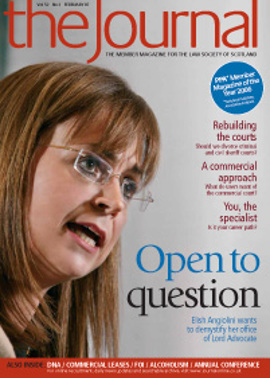Making a specialism pay

A specialist has been defined as someone who knows more and more about less and less until he knows everything about nothing. Is specialism a good thing? If so, how do you achieve it, and how do you then make it pay?
It can certainly be argued that specialisation is not a good thing. A solicitor is supposed to be a man of business who can bring a broad perspective on a client’s affairs. It used to be that counsel were the specialists. Now we are seeing solicitors specialise more and more while the relatively small bar in Scotland does not get that opportunity. The law has become ever more complex and it is impossible for any practitioner to keep up with all areas. Furthermore, we all need our “USP” (unique selling point), which specialisation gives. Good or bad, therefore, this article begins with the assumption that specialisation is inevitable.
How to choose a specialism?
Like most things in life, a career path, becoming a specialist, is partly a matter of choice, which will need to take into account the abilities and interests of the individual, and partly one of circumstances. Identifying a specialism therefore is something which can only be done from where one is. The first specialisms were probably between chambers and court practice. Specialism is now much more focused than that. My own specialism of pensions law has become ever more focused as the law has become ever more complex. New specialisms seem to arise all the time. Other older specialisms have found new ways to manifest themselves, such as insolvency becoming corporate recovery or reconstruction.
Any practitioner seeking to specialise will require to identify their specialism, keeping in mind their own abilities and knowledge, and also the pool of actual and realistically prospective clients. Think carefully about the type of work which will be involved. For example, many conveyancers thought that a specialism in environmental law would give them a unique selling point – until they discovered that most environmental questions were of a criminal or at any rate court-related nature. It can be invaluable therefore to consider what the role of the specialist lawyer is likely to be, and in particular to pick the brains of someone already practising as one – if they are willing to share their knowledge and expertise to that extent!
The knowledge and the clientele
While there are lessons which apply to any practice area, one should not be too general about specialisation! Therefore what I have to say is much derived from experience as a pensions lawyer and those within other fields can adapt and apply as appropriate.
What do pension lawyers do? The work varies considerably. Even within my firm’s pensions team the three partners, and indeed the assistants, specialise in different things. Although we probably all cover a fair range, there are certain things which tend to be passed to one or other of us.
Mostly what we do can be broken down into one of three things – acting for trustees of a pension arrangement or some other provider such as an insurance company, for an employer, or for an individual such as a scheme member. These of course interact and, say, a documentation matter or a Pensions Ombudsman dispute could be seen from any one of several angles.
The issues which arise in a specialism involve a knowledge of specific aspects of general law, overlaid with at least one layer of regulatory requirements. Regarding pension fund investment, for example, there are the implied and express powers of trustees in general law plus further implied powers under the Pensions Act 1995. Those, however, are restricted generally by the 1995 Act and there are also particular restrictions in relation to certain types of schemes such as contracted-out schemes. Furthermore the Inland Revenue have a great many general qualifications regarding investment, and even more for particular types of schemes such as small self-administered schemes.
Establishing a practice
Where does a specialist’s business come from? Usually it is from a variety of sources which have to be cultivated.
Existing clients are clearly a very important area and these can be cultivated by normal business development techniques, including a specialist newsletter.
Other sources of business can be referrals from other solicitors and other professionals who operate in the chosen field such as accountants, actuaries, independent financial advisers and others. To get these referrals some sort of expertise has to be built up.
This can be the difficult part. There is no easy way of gaining a reputation without having the work to make the reputation, and vice versa.
Whatever the specialism there will almost certainly be some form of professional or industry association.
Subscribing to these brings varying benefits at varying costs, though likely to be between £500 and £2,000. The National Association of Pension Funds, for example, is particularly expensive and their conferences are very expensive indeed. They do, however, publish a useful newsletter. The information service (available at an additional cost) is very helpful and their “made simple” series (which deals with legal topics and also matters such as investment) is excellent.
Gaining accreditation
Once you have done a bit of work you can enquire about the specialist accreditation scheme run by the Law Society of Scotland (see panel), although you do need to have done a fair amount of specialist work. The requirements vary with the different specialisms. You will, however, need a high degree of specialist knowledge. If you are going to take this seriously you will have to subscribe to appropriate publications. There are also computer-based aids.
Generally, “specialising” in more than one specialism is discouraged. Some clearly can operate together, such as agricultural law and crofting law. There will however always be a suspicion (whether within the accreditation panel, the profession more generally or even the public), of those who become experts of whatever disease or injury is contained in the last departing ambulance they are chasing.
The numbers accredited under the different specialisms vary from five to over 70.
Other qualifications might also be sought. For example, those specialising in insolvency law might seek to register themselves as insolvency practitioners; those dealing with trust law might also take a specialist qualification in taxation, such as the Institute of Taxation examinations.
Your specialism and…
Many areas of specialism are undoubtedly complicated. That is why they become specialised! Regrettably, with some areas (like pensions or financial services) the government and its agencies cannot leave things alone and change them every few minutes. It is therefore not easy to combine a specialism with doing other things. However, while my firm’s pension lawyers specialise in pension schemes solely, many do other work such as share schemes or combine it with wider things such as corporate tax.
Such a combination can become a speciality in itself. An obvious one is pensions on divorce, advising people which option to choose including seeking a lump sum, earmarking, or pension splitting – or indeed which to choose to be the victim of. That will need a lot of care and knowledge, and also financial and investment understanding and knowledge.
Pensions can also be combined with employment law. In any specialism which impacts on the world of commerce and industry, transactional work can be a useful crossover into the specialism.
It is important to be organised with documents and styles. Pensions documentation tends to be very complex, and in the case of trust deeds and rules can be very long. Building up a bank of styles in order to produce something quickly and economically for a client is a huge investment if you do not have a great deal of business.
Even conveyancing can become a pensions-related specialism. Small self-administered schemes and self-invested personal pension schemes can be used to purchase property (subject to limitations) and let it as an investment. Because of the complexity of pensions law it is not something which should be lightly taken on by a conveyancer. However it can be useful to combine pensions and conveyancing expertise to provide this service to the client.
Reward for the job
It is fairly readily accepted that a specialism should be rewarded more highly than general practice.
Like other areas of law, fees can be undertaken on a number of bases. Sometimes the work is of a very general nature without clear limit on the instructions, in which case an hourly rates basis is usually best. Hourly rates for pensions work for a partner tend to be higher than other types of work and may vary between about £225-275, and probably nearer the upper end. Other levels of specialist fee earner can be based on such a benchmark.
Some clients who have regular dealings might seek a retainer of so much per annum or per quarter, basic, with other jobs charged in addition. It is becoming more common to expect some jobs such as a documentation to be done on a fixed fee. Where doing reference work for other professionals, it is often expected that there will be a fixed fee for given types of work so that those can be readily be quoted to the client.
All in all therefore it can be seen that a specialism is not lightly to be undertaken. It requires a great deal of background knowledge, a great deal of keeping up to date and perhaps a great deal of investment in styles. If you do that it can be rewarding.
If you do not want to, then subcontract to a specialist.
Iain Talman is a partner in Biggart Baillie, Glasgow
RECOGNISED SPECIALISMS, AND HOW TO BECOME ACCREDITED
There are now around two dozen areas of specialist expertise, being agricultural law, charity law, child law, commercial leasing, construction law, crofting law, discrimination law, employment law, environmental law, family law, insolvency law, incapacity and mental disability law, intellectual property law, liquor licensing law, medical negligence law, medical negligence (defender only), mental health law, pensions law, personal injury law, planning law, professional negligence law, public procurement law and trust law.
The origin of this was to provide a panel of specialists (who are not allowed to call themselves experts!) who met prescribed criteria and who were prepared to accept references from other solicitors on a professional agency basis. They would be expected not to seek to poach the client. The criteria vary across the specialisms. They involve a period qualified, a period working within the specialism and a minimum of chargeable hours over a sustained period. Additional criteria may also apply, again depending on the specialism.
The application form and guidance notes can be found on the Society’s website at www.lawscot.org.uk/Members_Information/rules_and_guidance/guides/Rules/special/special.aspx
In this issue
- Routes to qualification: the Italian picture
- Speaking of change
- Disabled from suing?
- Hearing and answering
- Court afresh
- Clean sheet at the Commercial Court
- Making a specialism pay
- LCN DNA - devil in the detail
- To buy or not to buy?
- Just a winter warmer?
- Views from the new boy
- Working out time
- A claim in trust
- Incapable of dismissal?
- Chasing debts made simple?
- Scottish Solicitors' Discipline Tribunal
- Website reviews
- Book reviews
- FOISA goes to court
- On the wrong track?






